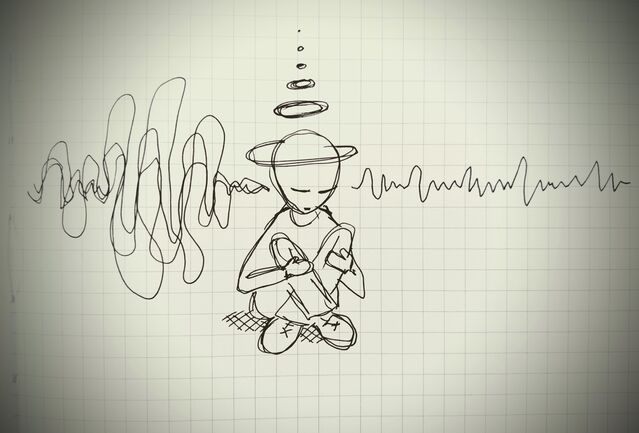Anxiety
How to Get Through a Panic Attack
The three Bs of surviving acute anxiety.
Posted July 22, 2020 Reviewed by Kaja Perina
I’m sitting down to get things done this morning and I can feel the anxiety building. At first, it's just a barely audible tap, tap, tapping in my mind...
My kids are back in daycare (for an undetermined length of time, given the way COVID is going). It’s my daughter’s birthday and I have to make sure everything is beautiful and perfect before she gets home and my entire family jumps on the Zoom birthday party to check my work. I have a major presentation in a week that just got moved online to a platform I have to learn from scratch. I have 6 clients later today, and 20 more this week.
Here comes the death spiral. Can I get to it all in time? Why didn’t I just do this yesterday? Why can't I handle the simplest tasks? I’m such an idiot! I'm never going to change. All this effort is pointless. I try, and I try, and... can’t take it! Why am I like this? It’s never going to end. Oh my God, this is never going to end!
Oh, whoa. How did I get so worked up?
I work with a lot of people who, since the start of the pandemic, are seeing their usually manageable anxiety escalate into panic attacks, often for the first time.
Anxiety attacks, AKA panic attacks,* are experienced differently for everyone. For me, it tends to be a feeling of constriction, of being trapped. My body goes into threat-mode overdrive--speedy heart, quick lungs, and increasingly negative thoughts, in an ever-accelerating loop. Soon, I'm completely paralyzed and groundless. My vision closes in on me, and everything in my periphery is lost to blackout.
What Is a Panic Attack?
At the physiological level, panic attacks are hyperventilation. You’re taking in way too much oxygen and not expelling enough carbon dioxide, but your brain screams that you need to breathe more, more, more! More air! Or you will die! You are dying!
This is why you sometimes see people breathing into paper bags, limiting the introduction of additional oxygen into an already oxygen-overloaded system.
Because this physiological mix-up is at the root of the problem, we have to address it physiologically. We have to get our breathing to slow down. That helps our brains slow down.

How Do I Survive One?
If you feel that anxiety building, or if it’s already DEFCON 1, consider trying the three Bs to get you through the crisis:
1. Body
Find a way to feel grounded. That’s psychology speak for “get out of your head.” Be here now. Feel your feet on the ground. Don’t just visualize or think about your feet on the ground, really feel them. Attend to the micro-sensations of each toe, each inch of foot skin, that is touching the ground. Notice the gravity, the heaviness. Now you have your anchor.
You could also hold one hand with the other. Note the soft, warm sensations of touching and being touched on each hand. Use physical touch to bring you out of your head and back into your body, and to remind yourself, “I’m here. I’m safe. I’m in my room. This is just anxiety.” I know it feels like something terrible is happening, but it’s not—those are just your thoughts about the past or about what might happen in the future.
2. Brain
Find a way to engage your brain so that it can’t think (as many) dark thoughts while you’re trying to calm your body down. Count backward from 100 by 2s, recite the alphabet backward, start with 50 and add 2, minus 1, over and over. Something that is neutral but requires mental effort.
3. Breath
This is the big one. This may be easier now that you’ve distracted your mind with busywork and reminded yourself that you’re in your body, right here, right now, and not falling into the existential abyss.
The goal here is not to breathe “deeply,” as that seems to encourage inhaling more oxygen, but to lengthen your exhale. Lengthening your exhale activates the parasympathetic nervous system, which is the one that helps your body calm down after a threat has passed (think “paramedics”).
I find it most helpful to forget the inhale altogether (your body is just fine remembering to inhale on its own), and to focus on the exhale alone.
Count the length of the first out-breath you can catch. Maybe it’s just a count of 1 or 2. On the next breath, try to up it by 1. Try to get to where you’re exhaling for 4-6 counts or so, or at least double the length of your in-breath.
It might be helpful to pretend you’re blowing out (slowly) through a straw. Let out a tiny bit of air in a slow and steady stream so that it lasts a really long time.
Repeat this for as long as it takes. If you find your mind gearing up again, re-engage your busywork strategy (counting backward, etc.). If you find yourself feeling ungrounded again, go back to those body sensations. Re-anchor. Start again. Do this until your breath feels more regular, and you can look around the room and notice all the things in it.
Congratulations, you have survived.
The 3 Bs are easy to remember and relatively simple. If you practice them outside of crisis moments, you’ll be even more likely to remember and use them (hello, automaticity!). And if you train a parent, friend, or partner to slow down and guide you through the process when they see you struggling, you’ll find even more pervasive relief.
Of course, if you find yourself worried about having another attack in between attacks, and especially if you start avoiding people, places, or things you’d otherwise be meeting with, going to, or doing, it’s probably time to find a professional to help navigate.
In the meantime, try to stay aware of your body so you can catch the earliest hint of anxiety. When your throat starts closing up or your mind suddenly fills with more Is and shoulds and nevers than usual, grab your 3 Bs and go to work.
*Note: You can read about what makes it a “panic attack” vs. an “anxiety attack” here, but in my personal and professional experience, this is typically a distinction without a difference. Both are scary, require attention, and involve the same cognitive and physiological mechanisms—panic attacks just seem to appear more suddenly and escalate further and faster.




